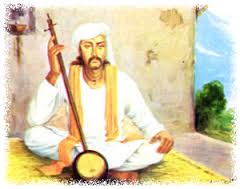 “Utter the Name ambrosial esssence of all existence, By which torments not death, nor occurs birth, Old age or fear of death.”
“Utter the Name ambrosial esssence of all existence, By which torments not death, nor occurs birth, Old age or fear of death.”
JAIDEV (JAYADEVA), saint and poet, two of whose hymns are incorporated in the Guru Granth Sãhib, is chiefly known to the literary world as the author of the Gita Govinda, a lyrical poem in which the love of Rãdhã (soul or devotee) for Govinda (the Supreme Being) is described symbolically and mystically. Jaidev was born at Kindu Bilvã which, according to some, is now Kenduli, in Birbhüm district of West Bengal, on the river Ajay and, according to others, Kendüli-Sasan, on Prachi river, near jagannath Puri in Orissã. At the end of his poem, he has given his fathers name as Bhojadeva and mothers as Rãdhãdevl, deciphered also as Ramãdevi, or Vãmadcvi. He is said to have flourished in the reign of Raja Karnarnav (AD 1142-56) and Rãjã Purushottam Dev (AD 1170-80), both of Orissã. Several legends about him are recorded in the Bhaklamal of Chandradatta. In his youth, he led the life of an ascetic and a wandering preacher. The course changed for him as, while in Puri once, a Brãhmarm forced the hand of his daughter on him. It turned out to be a happy marriage. His wife sang with him the devotional songs which were of his own composition. He spent some years at Katham Kancli, now called Jaidevpur in his memory, where he composed his immortal lyric, the Gita Govinda. From devotee of Lord Krsna he became a devotee of the Supreme Lord. He roamed about the country preaching the gospel of love of God and of man. Rãjã Lakshmian Sen (AD 1175-1200), of Bengal, became his disciple. Jaidev lived long and died in the village where he was born, in happy retirement. There is a samadhi of the saint in the village and an annual fair is belch on the first of Magh.
Besides the Gila Govinda, two other compositions, the Rasanã Raghava, a drama, and the Chanthalok, an essay on the grace of style, are also ascribed to him.
Jaidevs hymns in the Guru Granth Sãhib, one in Raga Gujari and the other in Rãga Märü, are in adoration of Hari, the Supreme Being. Duality, he says, ended for me as I remembered God who is the fountainhead of all virtue. Cherish the Divine Name in your heart. By repeating His praise you will break the circuit of birth and death, and you will dread death no more. Your heart and your word and deed should be imbued with the love of One Hari alone. Bhãi Gurdas in his Vàrañ, X. 10, pays tribute to Jaidevs loving devotion whereby he attained the state when no distinction remains between the devotee and the infinite.
Bhagat Jaidev was a Saint & Poet, his childhood name was Pardharmrik, and was born in the southern part of Bengal. His mother’s name was Rama Devi (also called Bani Devi by some) & father’s name was Bhojdev. The village of Jaidev’s birth is situated in the district of Bir Bhumi on the River Ajay. Jaidev was orphaned early in childhood. He used to express grief at the loss of his parents by composing sad songs, and then by singing them. Narinjan, one of his father’s friends, fraudulently usurped the entire family property, this helped trigger Jaidev’s tendency toward renunciation & detachment even further. It was in such a mood of detachment that Jaidev devoted himself to the worship of Lord Krishna. His austere nature became so strong and intense that he used to avoid sitting in the shade of a tree for long lest it should attach him to the comfort it provided and become an obstacle in the way of God-realisation. He had attachment only to God, and he used to sing His eulogies through His compositions. Thus, three volumes of his compositions came into being to be known as 1. Darshan Raghav 2. Geet Govinde 3. Chandia-Lok. Of these, his Geet Govinde has been generally accepted as better in terms of Poetics, music and thought contents. It is accepted amongst his followers that the Lord Akalpurkh himself would take the bodily form of Jagan Nath, so as to listen to his book and hear His eulogies face to face. As a result of his intense devotion towards Krishna, he was able to compose beautiful, mystical poetry. He remained for some time, a court poet & one of the five famous ‘jewels’ in the court of King Lachhman Sain of Bengal. Jaidev returned tohis native village towards his later years. He was too old & weak to go to the River Ganga to bathe therein. However, floods caused a miracle, perhaps an outburst of a devotess’s love for his deity. The Ganga river naturally shifted its course a little and started flowing just by Jaidev’s residence. What wonderful example of Nature’s love for its devotes!
Once it so happened that Jaidev stopped midway completing a verse, and God himself comleted it in his absence. Impressed further by this miracle, Jaidev dedicated himself more intensely to the worship of Lord Krishna. So he renounced his household and wide (Padmavati) and left for the forest to devote himself fully to the Master. In the forest, he found the word ‘Geet Govinde’ written on each leaf. This is how the Divine Spirit revealed itself to Jaidev. “Whichever direction I look to, I find only the Lord and nothing else”, but his is only one side of the coin, the other is as follows:
According to the 10th stanza of Ver X of Bhai Gurdas, when God Himself completed the verse left incomplete by Jaidev, the latter felt proud that God liked his verse so much that He showed inclination to complete it. No sooner had this ego erupted in his mind, he was surprised to find that the contents of his book ‘Geet Govinde’ was written on each leaf of the tree. Thus this miracle put an end to his pride. He made a supplication to God Almighty with utter humility and prayed that this lapse on his part be ignored. He had then realised that God is Omniscient, and is capable of doing anything. Man, however great, powerful and famous he may be, is nothing against Him. In fact, whatever a human being is, he is due to God’s grace. After this incident, Jaidev’s love, reverence and devotion towards God became more intense and immense. Guru Arjan Dev Ji, in his hymn recorded on Aang 1192 of Siri Guru Granth Sahib, has made an allusion to this and to Jaidev discarding this egoist tendency.
Sikh Bhagats
Baba Sheikh Farid Ji
Bhagat Kabir Ji
Bhagat Ravidas Ji
Bhagat Beni Ji
Bhagat Namdev ji
Bhagat Sadhana ji
Bhagat Bhikhan Ji
Bhagat Parmanand ji
Bhagat Sain ji
Bhagat Dhanna Ji
Bhagat Pipa ji
Bhagat Surdas ji
Bhagat Jaidev ji
Bhagat Ramanand Ji
Bhagat Trilochan ji
